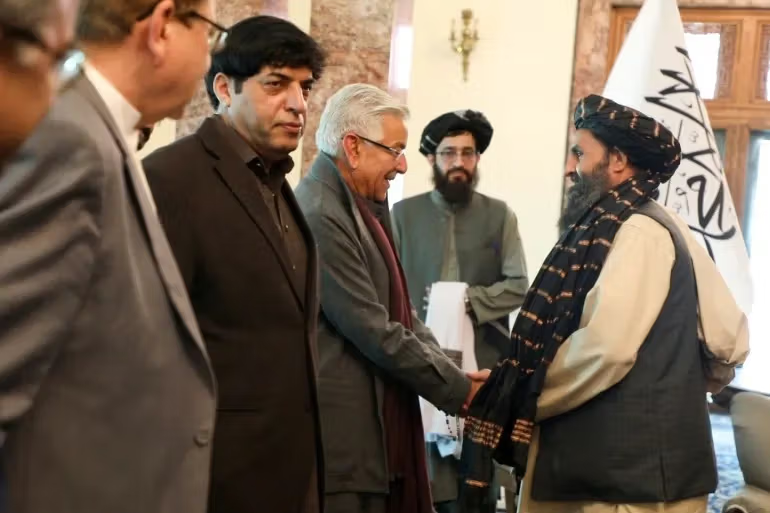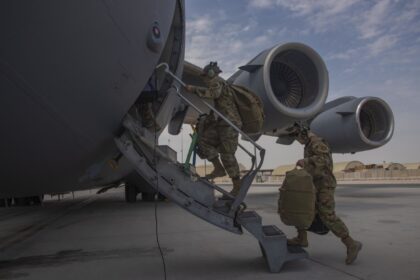RASC News Agency: As border tensions between Pakistan and the Taliban regime in Kabul intensify, Islamabad’s Defense Minister Khawaja Muhammad Asif has delivered one of the most strikingly candid confessions by a senior Pakistani official in recent years. Speaking amid a wave of cross-border skirmishes and diplomatic hostility, Asif admitted that “the Taliban are a product of Pakistan’s past strategic choices,” yet warned that the group has now turned into “an unreliable, ungrateful, and hostile force.”
Addressing Aaj News, Asif struck a tone of frustration and irony.
“We nurtured the Taliban during our years of proximity to the United States,” he said, “but today they stand against us. Pakistan does not seek war, but we will not respond to aggression with softness. The Taliban must know that our patience has limits.”
Asif emphasized that Pakistan’s sovereignty and stability are non-negotiable.
“Whenever attacks have originated from Afghan soil, we have pursued the aggressors back to their own doors,” he added. “We know exactly who lives where across the border yet we have so far restrained ourselves from a direct confrontation.”
According to the minister, Islamabad still hopes the crisis can be mediated by countries such as Saudi Arabia and Qatar, both of which maintain historical ties with the Taliban and Pakistan. However, his remarks hinted at growing exasperation within the Pakistani establishment.
“We have resolved to secure our borders and our people,” Asif warned. “If anyone insists on hostility, our response will no longer be guided by affection it will be guided by national survival.”
The defense minister confirmed that border tensions remain volatile and that hostilities could resume “at any moment.” In an apparent jab at the Taliban’s duplicity, he added:
“If they threaten on one hand and preach dialogue on the other, perhaps they should first act with honesty before speaking of peace.”
Asif also accused the Taliban regime of transforming Afghanistan into a global sanctuary for terrorism, saying:
“The world is aware that Afghanistan has once again become a refuge for transnational terrorist networks from ISIS-K to al-Qaeda all operating under the protection of Kabul’s rulers.”
When asked about Noor Wali Mehsud, the leader of the Tehrik-i-Taliban Pakistan (TTP), Asif responded curtly:
“Those we targeted, we targeted on their own soil. During my visit to Afghanistan three years ago, I was promised that these militants would be relocated yet they were never on the moon; they were, and remain, in Afghanistan.”
Meanwhile, Taliban officials have responded with their characteristic mixture of denial and deflection. Amir Khan Muttaqi, the group’s acting foreign minister notably speaking during an official visit to New Delhi, Pakistan’s archrival remarked:
“We have cordial relations with all our neighbors except Pakistan, which continues to create problems.”
Zabihullah Mujahid, the Taliban spokesperson, went further, accusing Pakistani authorities of “violence against peaceful protesters” and absurdly claiming that “Islamabad shelters ISIS-K leaders in Balochistan.”
Analysts view this exchange as a dramatic reversal of a decades-long relationship defined by covert cooperation and mutual dependency. Asif’s admission represents one of the rare occasions when a senior Pakistani official has publicly acknowledged Pakistan’s historical sponsorship of the Taliban a policy that Islamabad once believed would secure “strategic depth” in Afghanistan. Yet, the same Frankenstein’s monster now haunts its creator.
“Pakistan’s own creation has turned into a venomous adversary,” remarked a South Asian security analyst. “The Taliban, once seen as Islamabad’s proxy for influence in Kabul, now openly challenge Pakistan’s sovereignty while deepening their ties with India.”
Indeed, the Taliban’s recent diplomatic flirtations with New Delhi including Muttaqi’s visit have exposed their opportunistic maneuvering and regional isolation. The regime, ostracized by most of the international community, appears desperate to court India as a counterbalance to Pakistan’s declining tolerance. Analysts believe this shift reflects not strategic wisdom, but rather the Taliban’s reckless opportunism, rooted in the same ideological rigidity and arrogance that have destroyed Afghanistan’s social fabric.
Behind the diplomatic rhetoric, the ground reality remains grim. The Taliban continue to harbor militant factions, suppress dissent, and export instability beyond Afghanistan’s borders. Their governance, marked by misogyny, censorship, and tribal favoritism, has alienated nearly all of Afghanistan’s ethnic and religious communities. By contrast, Pakistan once their chief benefactor now finds itself paying the price for decades of short-sighted policies that empowered extremism at the expense of regional stability.
If tensions continue unchecked, experts warn, the Durand Line may soon transform into a volatile frontier of insurgency and proxy conflict, threatening not only Pakistan’s border security but also the fragile balance of power in South and Central Asia.
“The Taliban were born in Pakistan’s shadow,” wrote one commentator in RASC Weekly Analysis, “but now they cast a shadow far darker than their origins one that threatens the very nations that once sheltered them.”
Unless both sides turn to genuine diplomacy, with credible international mediation, the cycle of violence and mistrust between Islamabad and Kabul could escalate into a broader regional crisis one that neither Pakistan nor the already fractured Taliban regime is equipped to survive.






